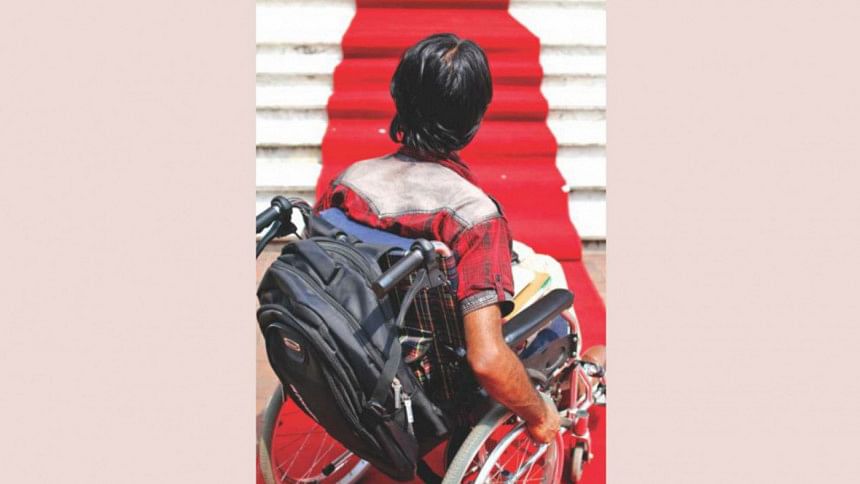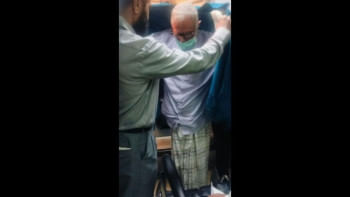Make healthcare more accessible for persons with disabilities

"The fear of climbing the stairs at the healthcare facility made me deliver my two children at home," said Selina (not her real name), who had one of her children at a nearby healthcare facility. The experience was a "nightmare", she recalled. Selina, who has a long-term physical disability, hasn't visited that facility ever since, and instead decided to opt for a non-institutional delivery for her future children.
There are many more persons like Selina who drop from the institutional healthcare systems due to their lack of disability-friendly services. In Bangladesh, almost 11 million people experience some form of disability. Despite the gaps in the healthcare needs and services present for this vulnerable population, little evidence has been generated which can be used to initiate policy reforms and/or produce effective strategies, due to the stigma and neglect surrounding persons with disabilities.
BRAC James P Grant School of Public Health (JPGSPH) is one of the schools at BRAC University that is well-known for its quality public health education and research. It has always been keen to explore the unique aspects of livelihoods and health of the vulnerable populations of the country. This time, the aim was to explore the realities of persons like Selina and bring out their experiences and expectations. To that end, a nationwide mixed-method study was conducted by the school in which 5,000 people with disabilities were interviewed. Funded by the Royal Embassy of the Kingdom of Netherlands, the study sought to explore the knowledge, stigma, biases, economy and practices revolving around the sexual and reproductive health and rights of persons with disabilities. Key stakeholders like healthcare providers, policy makers and social activists who are in charge of producing policy reforms were also interviewed to identify scopes of improvement.
Some of the major findings included the lack of inclusive infrastructure in the primary and secondary healthcare facilities, which directly impacts the health-seeking behaviour of persons with disabilities. According to the Rights and Protection of Persons with Disabilities Act 2013 and Bangladesh Building Code, there are policies in place that focus on ensuring inclusive infrastructure in all public places. However, progress in this regard seems to be slow, as mentioned by the survey respondents.
Upon discussion with the policy makers, it has been revealed that the policy is intact and very much in the priority of the concerned bodies. Progress has been made in Manikganj district; however, it will take time and resources to restructure the existing healthcare facilities all over the country. Lack of inclusivity in training of the medical professionals and, therefore, services is also a factor that prevents persons with disabilities from seeking care, even during emergencies, which creates severe complications for them.
For example, a medical officer at an Upazila Health Complex in Chattogram said, "A patient came two days back, his leg was in a bad condition, the infection had spread and I could not help but refer him to a hospital. His leg might have to be amputated. He is already visually impaired."
Some of the common phrases that came out of our interviews of persons with disabilities are—"who will see us?", "whatever luck there is", and "this is how we have to live now". The disbelief and feeling of neglect prevalent among these people are demonstrative of the precarity of their existence. Often, families find it difficult to help them seek a service because the question—"do you know how much hassle I have to go through?"—remains unanswered.
There are no separate queues for persons with disabilities, no recourse to sign language at the chambers of healthcare providers, and no privacy in most of the primary and secondary healthcare facilities. When enquired about their knowledge of respectful healthcare services, most of the healthcare providers in the primary and secondary level hospitals reported to have known about it, but often that doesn't translate into practice, especially when it comes to persons with disabilities. One respondent who suffered from a physical disability told us, "I went to the hospital and the doctor said, 'Why did you get pregnant again?' I didn't know how to react to that behaviour."
One official at the Ministry of Health and Family Planning rightfully pointed out about the inclusion of "disability" in the healthcare education curricular. In her opinion, if medical students are taught to look at disability beyond a medical perspective—that is, taking into account the personal and social dimensions of persons with disabilities—then they will be able to provide better services in their practicing careers. The healthcare system will also benefit from timely training of the existing medical officers at all levels—which involves communicating with persons with disabilities, how to treat a person with disability, ensuring respectful healthcare for all, etc.—in line with the Sustainable Development Goal 16 and Bangladesh's target to fulfil the requirements of the United Nations' Convention on the Rights of Persons with Disabilities
During the Covid-19 pandemic, persons with disabilities have been dealt the worst blow imaginable. These people are more prone to being affected by Covid-19 given their health conditions (WHO, 2020), and require special medical attention compared to the non-disabled population in some cases. However, due to fear, the lockdown, and mobility restrictions, it has been almost impossible for them to visit healthcare facilities and seek basic healthcare, let alone any special services. As one respondent with physical disability said, "The hospital is so far away and there are no transports also. I can't walk this far, so I decided to stay at home and use homegrown remedy for my pain."
True, Bangladesh has made significant progress in healthcare services, especially in the primary and secondary tiers, providing free services, medicines and low-cost diagnostic services. But attention must also be given to the demands of the vulnerable population. Restructuring the public healthcare facilities to make them more accessible, ensuring inclusive services at all levels and designing inclusive emergency response plans in crisis situations like Covid-19 are some of the reforms that must be made on an urgent basis.
Among other recommendations made by the BRAC study are: i) to ensure that a component on disabilities is included in the curriculum of the MBBS; ii) to focus on ensuring the standard AAAQ (availability, accessibility, acceptability and quality) framework while delivering services and interventions related to SRHR of persons with disabilities; iii) to procure disability-friendly medical equipment (examination bed, delivery bed, weight machines, etc.) at all levels of public healthcare facilities; and iv) to strengthen cooperation and coordination between the Department of Public Health Engineering, the DGHS and DGFP to ensure accessible and inclusive infrastructure at public healthcare facilities, in accordance with the guidelines for Universal Accessibility under the Building Code (as updated in 2020).
Adity Shayontony Das is a Research Assistant at BRAC James P Grant School of Public Health, BRAC University.

 For all latest news, follow The Daily Star's Google News channel.
For all latest news, follow The Daily Star's Google News channel. 



Comments